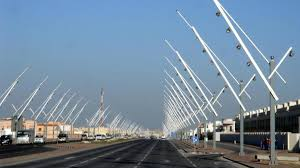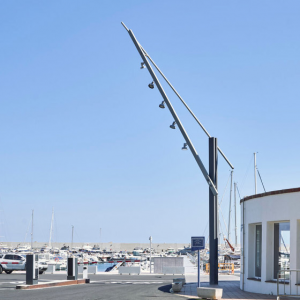The plaintiff in these proceedings is an architect who has developed several urban and architectural projects. The plaintiff has maintained a contractual relationship with the group Santa & Cole Ediciones de Diseños S.A. to which she assigned the patrimonial rights of the design of a lamp called LATINA with the purpose of commercializing it. Currently, the lamppost is installed in several cities around the world.
On the other hand, Ashghal is a state-owned commercial entity that channels all the public works of the State of Qatar. In 2005, this entity initiated the first contacts with Santa & Cole to carry out a project for the lighting of Al Waab Avenue in Doha. After several modifications, a project was established with the intention of installing 920 LATINA lampposts. However, Ashgal decided to install an identical copy of the LATINA lamposts. Those fake lampposts were designed by the company Al Shula Lighting.
For this reason, the plaintiff filed a lawsuit against Ashghal and the State of Qatar in Spain, as she considered that her moral rights were being infringed by the installation, without her authorization, of a copy of the aforementioned LATINA lamppost on Al Waab Avenue in the city of Doha.


However, the defendants filed a declinatory action for lack of international jurisdiction, which was dismissed at first instance, ordering the continuation of the proceedings. The company Ashghal and the State of Qatar argued that the claim filed by the plaintiff was nothing more than a fraud whose sole purpose was to assess the success of the claim so that the Santa & Cole Entity could successfully claim pecuniary damages through a subsequent proceeding. They also argued that the object of the proceeding is not an original work but a mere industrial design. Furthermore, they argue that the statute of limitations has expired and deny the liability of the State of Qatar, as they consider that in any case the infringement was committed by the private companies that manufactured and installed the lamposts, since the company Ashghal merely tendered for a public work.
The claim was partially upheld at first instance as the court noted that Spanish law was applicable and that the action was not time-barred due to the fact that moral rights were not subject to any time limit and that the work in question was sufficiently original to merit the protection sought, ordering the defendant to cease the conduct (removing and destroying the lampposts) and paying the plaintiff the sum of €50,000 in compensation for moral damages.
However, both parties appealed the previous decision. The plaintiff considered that the compensation was insufficient and demanded that the defendants were ordered to pay the costs and to publish the judgment. The defendants reiterated the lack of originality of the industrial design, alleged the diplomatic immunity of the State of Qatar and the lack of jurisdiction of the Spanish courts to impose the removal of the lampposts. Both appeals were partially upheld, despite rejecting the lack of jurisdiction of the Spanish courts, the State of Qatar was found to lack passive standing. The judgment declared the infringement of the rights of paternity and integrity of the plaintiff and set damages at 100,000 € in addition to imposing the costs of the procedure to Ashghal. The Court concluded that the object of the proceeding has a high level of originality and should be protected as it is a very particular design of a street lamp.
In response to the aforementioned decision, the defendants filed an extraordinary appeal for procedural infringement and an appeal in cassation. However, the Court of Cassation ruled that the State of Qatar has no jurisdiction to appeal the previous decision, as it does not cause any damage to It. Therefore, the appeals will only be presented by the company Ashghal. In the appeal for procedural infringement, it is alleged that the jurisdictional competence of these proceedings does not correspond to the Spanish courts, since the infringement has occurred in Qatar and according to the rules of international jurisdiction, the applicable forum is the one where the damage has originated.
After examining the issue raised, the Court considered that since the issue was the reproduction of the work in a traditional medium (not through the Internet) consisting of the installation of lampposts in the public street of Doha, the public communication of the plagiarized work has taken place in Qatar. Therefore, it must be considered that the causal event and the manifestation of the damage occurred both outside Spain. In this sense, the fact that the plaintiff has its center of main interests in Spain and that it is in this State where it develops its creative work does not constitute an adequate link to attribute the international jurisdiction to the Spanish courts.
Supreme Court Judgment 735/2025 of February 26, 2025


 Español
Español Deutsch
Deutsch